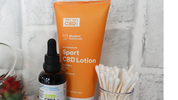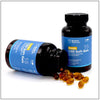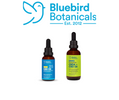Top 5 Skincare Ingredients to Avoid – And What to Use Instead (CBD Cream & More!)

Introduction: Why Skincare Ingredients Matter
Your skin is your body’s largest organ, and what you put on it matters. Many skincare products contain ingredients that may do more harm than good, stripping the skin of moisture, causing irritation, or leading to long-term damage.
As consumers become more conscious of their skincare choices, CBD products have emerged as a natural alternative. From CBD cream to botanical-infused moisturizers, many people are switching to cleaner, plant-based skincare options that support skin health.
With the growing availability of CBD skincare, it’s important to understand what to avoid in traditional products. Harmful skincare ingredients can disrupt the skin’s natural balance, but with CBD cream and other broad spectrum CBD formulations, people now have access to products that support their skin without unnecessary additives.
In this guide, we’ll uncover five skincare ingredients you should stop using and explore better alternatives—including how CBD-infused skincare can offer a more natural approach. If you’re looking for effective, plant-based solutions, keep reading to learn more about what’s best for your skin.
1. Simple Alcohols – Why They Harm Your Skin
Many skincare products contain alcohol-based ingredients to create lightweight, fast-drying formulas. While some alcohols can be beneficial, simple alcohols like SD alcohol 40, denatured alcohol, and isopropyl alcohol can strip the skin of moisture and weaken its protective barrier.
These harsh alcohols remove natural oils from the skin, leading to dryness, irritation, and increased sensitivity. Over time, this can disrupt the skin’s ability to retain hydration, making it more prone to redness and premature aging. Some people may experience a rebound effect, where the skin overproduces oil to compensate for excessive dryness, leading to breakouts and imbalance.
A Better Alternative: CBD Cream for Hydration
Instead of using skincare products with drying alcohols, look for CBD cream formulated with nourishing botanicals and broad spectrum CBD. These products can help maintain the skin’s moisture barrier without causing irritation. Unlike simple alcohols, CBD-infused skincare often contains plant-based oils and hydrating compounds that work to soothe and replenish the skin.
When choosing a CBD cream, check for third-party lab testing and high-quality ingredients that support skin hydration. Many CBD products are now available in the skincare market, offering a plant-based alternative to harsh formulations. If you're looking to make the switch, consider exploring options from reputable brands that offer clean, alcohol-free formulations.
2. Citrus Juices – The Risk of Skin Sensitivity
Lemon, lime, and other citrus extracts are often promoted as natural skincare solutions, especially in DIY treatments. While these fruits contain vitamin C and citric acid, applying them directly to the skin can cause more harm than good. Citrus juices are highly acidic, which can disrupt the skin’s pH balance and lead to irritation, redness, and even chemical burns.
One of the biggest concerns with citrus-based skincare is phytophotodermatitis, a reaction that occurs when citrus juice is exposed to sunlight. This can cause dark patches, burns, and long-term skin damage. Despite their popularity in homemade skincare, these acidic juices are best avoided in favor of gentler, more balanced alternatives.
A Better Alternative: CBD Cream for Skin Balance
Instead of using citrus-based products, opt for CBD cream infused with soothing botanical extracts. CBD products formulated for skincare often include antioxidants and plant-derived oils that help maintain the skin’s natural balance without irritation.
Unlike harsh acids, broad spectrum CBD works alongside the skin’s natural barrier, helping it stay hydrated and calm. Many high-quality CBD skincare options also contain essential oils and vitamins, offering a gentle, non-irritating way to support your skin.
If you’re searching for a reliable alternative to harsh citrus treatments, consider trying a CBD-infused moisturizer. Be sure to check for lab-tested CBD products from trusted brands when making your selection. If you're looking to make the switch, explore options from reputable companies that allow you to buy CBD with confidence.
3. Adhesive Charcoal Masks – Harsh on Skin, Tough to Remove
Charcoal masks have gained popularity as a deep-cleaning skincare solution, often marketed for their ability to remove dirt, oil, and impurities from the skin. However, adhesive charcoal masks can be extremely harsh, especially for those with sensitive or dry skin.
These masks work by sticking to the skin and peeling away debris from the surface, but in doing so, they can also strip away essential natural oils and weaken the skin barrier. Many users experience redness, irritation, and even painful peeling when removing these masks. Over time, excessive use of harsh exfoliating treatments like adhesive charcoal masks can lead to inflammation, enlarged pores, and uneven skin texture.
A Better Alternative: CBD Cream for Gentle Skin Support
Instead of using harsh peel-off masks, consider switching to CBD cream formulated with hydrating and soothing ingredients. CBD products designed for skincare help nourish the skin while supporting its natural balance, making them a gentler option for cleansing and hydration.
Many broad spectrum CBD creams also include botanical extracts and essential oils that can help maintain a healthy skin barrier without causing irritation. Unlike aggressive peel-off treatments, CBD-infused skincare provides hydration and antioxidant support without damaging the skin.
When choosing a CBD skincare product, look for options that are dermatologist-tested and free from synthetic adhesives or harsh exfoliants. If you’re looking for a natural alternative, consider exploring trusted retailers where you can buy CBD products designed to support skin health without unnecessary irritation.
4. Gel-Based Antiperspirants – Clogged Pores and Skin Irritation
Many traditional deodorants and gel-based antiperspirants contain aluminum-based compounds designed to block sweat glands and reduce perspiration. While this may seem beneficial, these ingredients can clog pores, leading to skin irritation, breakouts, and underarm sensitivity.
Some antiperspirants also contain synthetic fragrances, parabens, and alcohols, which may contribute to dryness and discomfort. Frequent use of these products, especially on shaved or sensitive skin, can cause redness, itching, and increased skin sensitivity over time.
A Better Alternative: CBD Cream for Underarm Care
If you’re looking for a more natural option, consider using CBD cream as part of your skincare routine. Many CBD products are formulated with plant-based ingredients that help soothe the skin without clogging pores.
Unlike traditional antiperspirants, broad spectrum CBD creams and lotions provide hydration and skin-supporting benefits while allowing the skin to breathe. Many high-quality CBD skincare products also include botanical extracts to nourish and calm sensitive areas.
When switching to CBD-infused skincare, look for lab-tested CBD products that are free from synthetic additives. If you’re ready to explore a gentler, more skin-friendly option, check out reputable retailers where you can buy CBD from trusted brands.
5. Cheap Lotions & Miracle Creams – False Promises, Weak Formulations
Many budget-friendly lotions and so-called miracle creams make big promises about hydration, anti-aging, or instant skin transformation. However, these products often contain low-quality fillers, synthetic fragrances, and excessive preservatives that do little to nourish the skin.
Cheap lotions tend to be water-based with minimal active ingredients, meaning they evaporate quickly, leaving the skin feeling dry again within hours. Some even contain harsh alcohols that strip away natural moisture rather than locking it in.
Many miracle creams also overpromise and underdeliver, using marketing buzzwords without backing up their claims with quality ingredients or third-party testing. Without transparent labeling and proper formulation, these products may provide short-term results but often lack the nutrients needed for long-term skin health.
A Better Alternative: CBD Cream for Hydration & Skin Health
For those seeking a cleaner, plant-based option, CBD cream offers a high-quality alternative to cheap, filler-heavy lotions. Unlike synthetic formulas, CBD products designed for skincare are often made with botanical oils, essential fatty acids, and CBD Isolate or broad spectrum CBD, which help provide lasting hydration without irritating the skin.
Since CBD-infused skincare is often formulated with soothing plant compounds, it works alongside the skin’s natural balance instead of disrupting it. Many high-quality CBD skincare products are also third-party tested, ensuring that the ingredients match what’s on the label.
When shopping for CBD creams, look for full ingredient transparency and products that are free from synthetic fillers and harmful additives. If you’re ready to switch to a high-quality, plant-powered skincare solution, explore trusted retailers where you can buy CBD with confidence.
CBD Cream & Skincare: A Natural Alternative to Harsh Ingredients
Now that we’ve explored five skincare ingredients to avoid, it’s important to consider what to use instead. Many traditional skincare products contain fillers, synthetic chemicals, and harsh exfoliants that can cause irritation or dryness. This is where CBD cream and other CBD products offer a gentler, plant-based alternative.
Why CBD Cream is Gaining Popularity in Skincare
Unlike conventional lotions, CBD-infused skincare is formulated with botanical extracts and essential fatty acids that work to hydrate and nourish the skin. Many CBD products are also designed to support the skin’s natural barrier without clogging pores or causing irritation.
Some key benefits of broad spectrum CBD and CBD isolate in skincare include:
✔ Hydration – Helps retain moisture without synthetic fillers.
✔ Soothing Properties – A gentler option for those with sensitive skin.
✔ Antioxidant Support – Many CBD skincare formulations contain vitamin-rich botanical ingredients.
✔ Plant-Based Ingredients – Free from parabens, sulfates, and artificial fragrances.
Broad Spectrum CBD vs. CBD Isolate – What’s Better for Skincare?
When choosing a CBD cream, you may come across terms like broad spectrum CBD and CBD isolate. Here’s what you need to know:
-
Broad Spectrum CBD contains multiple cannabinoids and plant compounds, making it a fuller skincare experience.
-
CBD Isolate is a purified form of CBD with no additional cannabinoids. Some people prefer this for simpler, single-ingredient formulations.
Both options can be effective in CBD skincare, but broad spectrum CBD tends to be more popular for those looking for a multi-functional skincare solution.
How to Choose the Right CBD Cream for Your Skin
With so many CBD products on the market, selecting the right one can be overwhelming. Here are a few tips to help:
✔ Check the Ingredients – Look for CBD-infused skincare products that are free from parabens, sulfates, and synthetic dyes.
✔ Choose Third-Party Tested Products – High-quality brands always provide lab-tested CBD products to ensure transparency.
✔ Read Customer Reviews – Reputable retailers often showcase real user experiences to help guide your decision.
✔ Buy CBD from Trusted Sources – Avoid low-quality or unverified products by purchasing from CBD shops that specialize in skincare formulations.
By making the switch to CBD skincare, you can avoid harsh chemicals while choosing gentler, plant-based alternatives. If you’re looking for high-quality options, explore reputable stores where you can buy CBD with confidence.
FAQs: Everything You Need to Know About CBD Skincare
As more people explore CBD products for skincare, questions often arise about CBD cream, its benefits, and how to choose the right product. Below are answers to some of the most commonly asked questions to help you make an informed decision.
Q: What is CBD cream, and how does it work in skincare?
A: CBD cream is a topical product infused with CBD extract, often combined with plant-based ingredients to support skin hydration. Unlike lotions with synthetic fillers, CBD-infused skincare works alongside the skin’s natural barrier to moisturize and soothe without clogging pores.
Q: Is broad spectrum CBD better than CBD isolate for skin?
A: Broad spectrum CBD contains multiple plant compounds, including cannabinoids and terpenes, which can enhance skincare benefits. CBD isolate, on the other hand, is a purified form of CBD without additional cannabinoids. Many skincare enthusiasts prefer broad spectrum CBD for its botanical-rich formulation.
Q: Can CBD cream help with skin hydration?
A: Many CBD products are formulated with botanical extracts and essential oils to provide hydration and support for the skin barrier. Look for CBD-infused skincare with ingredients like shea butter, aloe vera, and jojoba oil for maximum moisturizing benefits.
Q: Are all CBD creams safe to use on sensitive skin?
A: Not all CBD skincare products are created equal. To ensure quality, always check for third-party lab-tested CBD products and avoid creams with synthetic fragrances, parabens, or harsh chemicals.
Q: Where can I buy CBD cream for skincare?
A: If you’re looking to buy CBD for skincare, choose reputable retailers that specialize in CBD-infused skincare. Many CBD shops offer lab-tested CBD products with full ingredient transparency, ensuring you get a high-quality product.
Final Thoughts: Making the Switch to CBD Skincare
As awareness of clean beauty grows, more people are turning to CBD cream and other CBD products as natural alternatives to conventional skincare. By avoiding harsh ingredients like alcohols, citrus acids, and synthetic additives, you can make better choices for your skin.
When choosing a CBD skincare product, prioritize broad spectrum CBD, third-party testing, and botanical-rich formulations. If you’re ready to explore plant-based hydration and skin support, consider switching to a CBD-infused moisturizer or CBD cream from a trusted source.
For those seeking high-quality options, explore reputable retailers where you can buy CBD with confidence and start experiencing the benefits of CBD skincare today.









